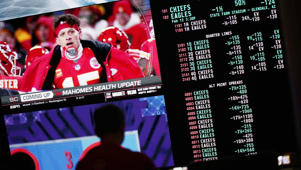
© John Locher, Associated Press A person gambles as betting odds for the Super Bowl are displayed on monitors at the Circa resort and casino sports book Friday, Feb. 3, 2023, in Las Vegas.
Let me see if I’ve got this straight. The NFL, which not only has struck up partnerships with several gambling businesses in recent years but brags about it in press releases, recently punished five of its players for — you guessed it — gambling.
This is what is known as talking out both sides of your mouth.
The NFL suspended Jameson Williams, Stanley Berryhill, Quintez Cephus and C.J. Moore (all of the Detroit Lions) and Shaka Toney (Washington Commanders). Williams and Berryhill received lighter suspensions (six games) because they didn’t bet on NFL games; they bet on college games at the team’s practice facility — the NFL prohibits gambling in a league facility. Cephus, Moore and Toney are suspended indefinitely because they bet on NFL games.
Which is exactly what the league hopes fans do! But not the players.
Just to be clear.
For decades the NFL stiff-armed anything that remotely smelled of gambling. This was based on the fear that players might use insider information to place bets or be tempted to throw games (see baseball’s Black Sox scandal), either under the sway of professional gamblers or to cover their own bets.
But the league started rethinking its position in 2018 when a Supreme Court ruling allowed states to legalize online sports gambling. Thirty-six states and the District of Columbia have since legalized sports betting (33 are operational), and the NFL got a whiff of money to be made. That’s what guides the league, whether it’s the NFL’s phony breast cancer awareness campaign or gambling. The fallout has been revealing.
Related
From 1963 to 2018 the NFL suspended three players for gambling. Since then it has suspended seven players. Calvin Ridley (then of the Atlanta Falcons) was suspended for the entire 2022-23 season.
Suddenly, the league’s attitude is: hooray for gambling! In 2021, the league made this announcement: “The National Football League today announced it has reached agreements with Fox Bet, BetMGM, PointsBet, and WynnBET to become approved sportsbook operators for the 2021 NFL season. These agreements make all four operators eligible to purchase NFL in-game commercial units and other select NFL media inventory.”
The league also announced its first-ever U.S. sportsbook partnerships with Caesars Entertainment, DraftKings and FanDuel worth $1 billion over five years.
“We are pleased to announce this select group as approved sportsbook operators,” said Nana-Yaw Asamoah, vice president of business development for the NFL. “Along with our three official sports betting partners, this group of operators will help the league to engage fans in responsible and innovative ways this season as the sports betting landscape continues to evolve.”
The league is getting increasingly cozy with the world of gambling. The 2022 NFL draft was held in Las Vegas. There were gambling commercials during the Super Bowl. A record 50 million Americans are thought to have wagered $16 billion on the Super Bowl — a 60% increase in one year.
But the league continues to tell the world that players can’t engage in gambling. This is like holding AA meetings in a bar.
As The Ringer’s Rodger Sherman wrote, “The NFL has eagerly welcomed the gambling industry into every nook and cranny of its product.”
He also noted that Williams was punished for placing a college football bet from a Lions’ training facility, “but Lions fans can gamble during games at Ford Field at the WynnBert sports bar inside the stadium.”
So gambling is legal for all sports in 36 states. The irony is thick. Pete Rose, baseball’s all-time hits leader, was permanently banned from baseball in 1989 for betting on the team he managed at the time, the Cincinnati Reds. On Jan. 1, Rose placed Ohio’s first legal sports bet, picking the Cincinnati Reds to win the 2023 World Series. You can bet the debate over Rose’s exclusion from the Baseball Hall of Fame will heat up again.
Legalized gambling is a very profitable venture for the states that have legalized sports betting. According to the American Gaming Association, Americans wagered $73 billion on sports in the first 10 months of 2022, up 70% year-over-year, and sports betting entities generated $5.77 billion off those wagers, up 78% year-over-year, and states and the federal government generated an estimated $1.3 billion.
Sports leagues are wise to protect their athletes from gambling interests, but it’s a tough sell when those leagues are dabbling in the business themselves. This latest suspension of professional athletes for gambling won’t be the last time they cross the blurry line that’s been drawn by the league office.

© John Locher, Associated Press
